外研版2017年中考一轮教材复习课件:八年级下册 Modules 9-10
文档属性
| 名称 | 外研版2017年中考一轮教材复习课件:八年级下册 Modules 9-10 | 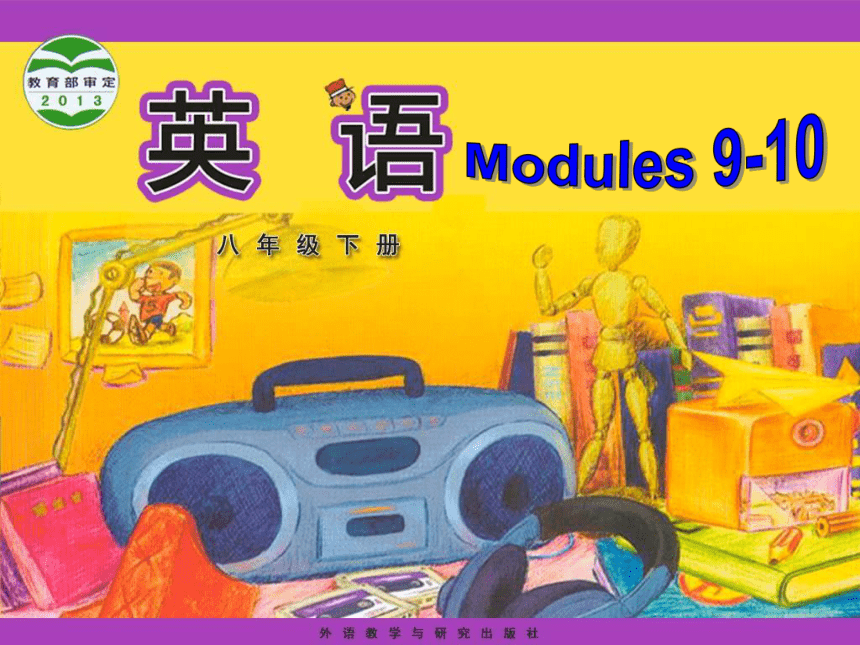 | |
| 格式 | zip | ||
| 文件大小 | 333.2KB | ||
| 资源类型 | 教案 | ||
| 版本资源 | 外研版 | ||
| 科目 | 英语 | ||
| 更新时间 | 2017-01-25 16:16:13 | ||
图片预览


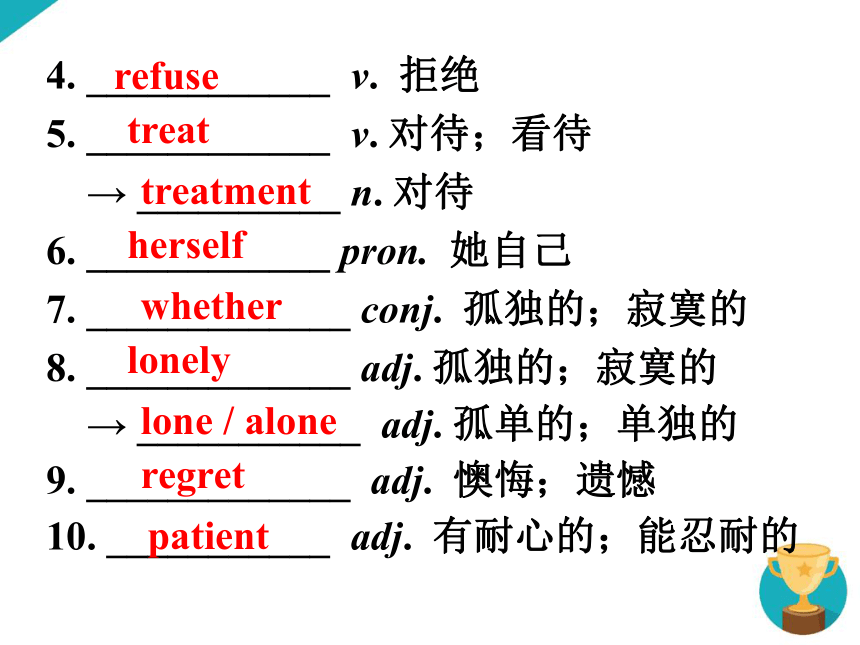
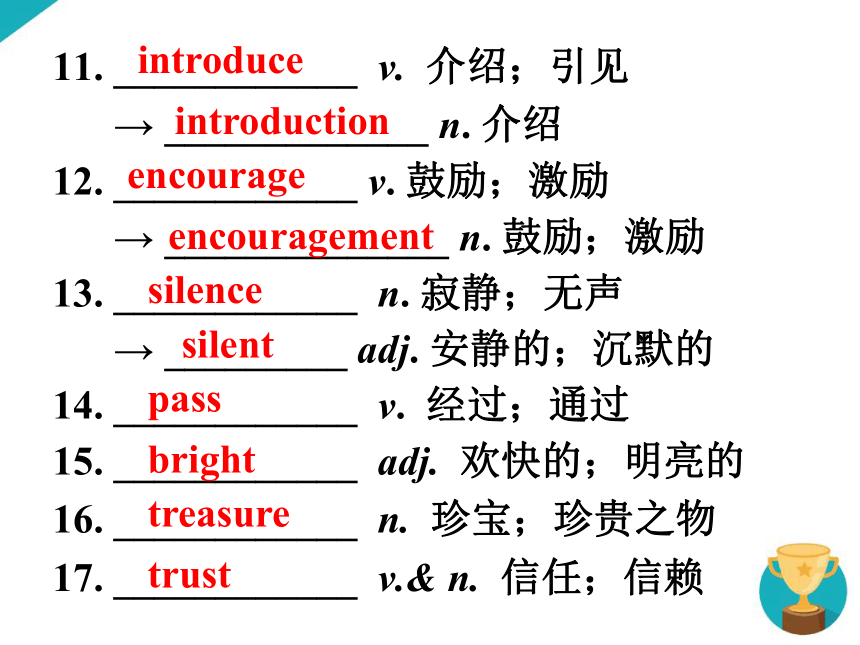
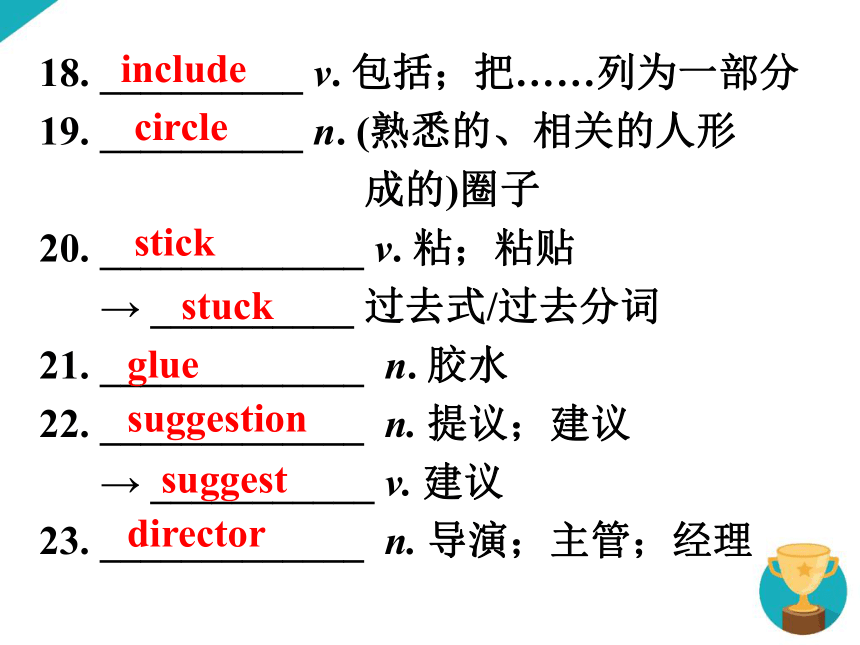
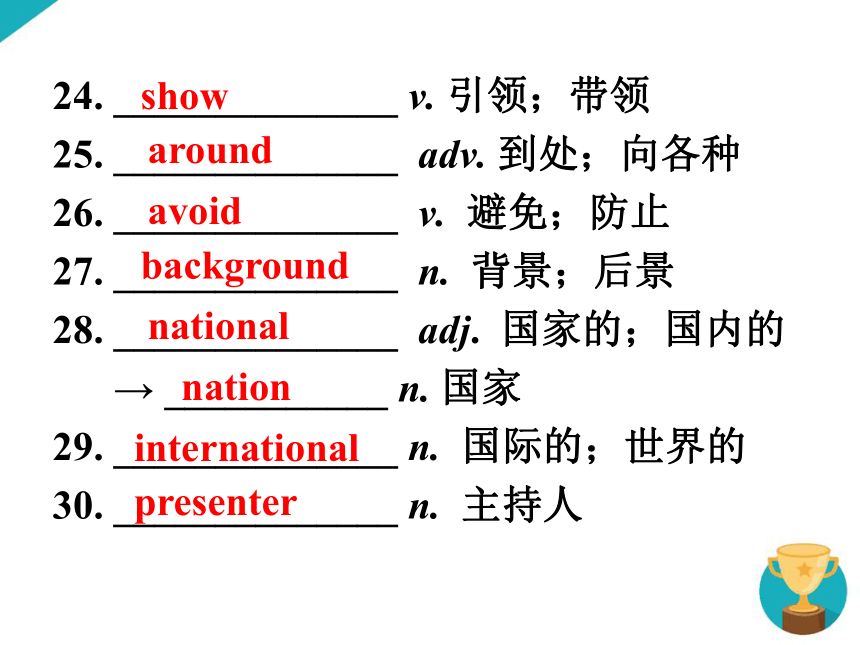
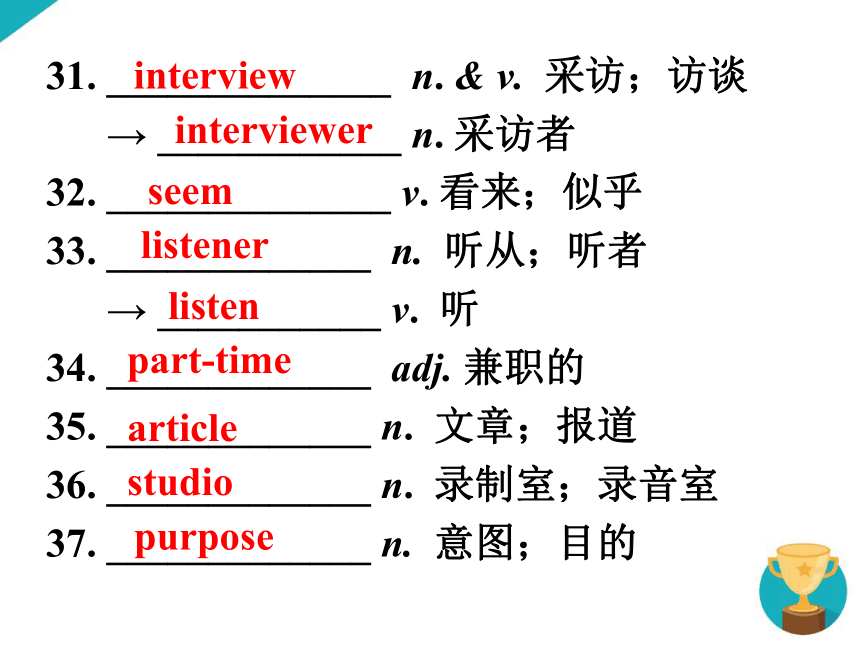
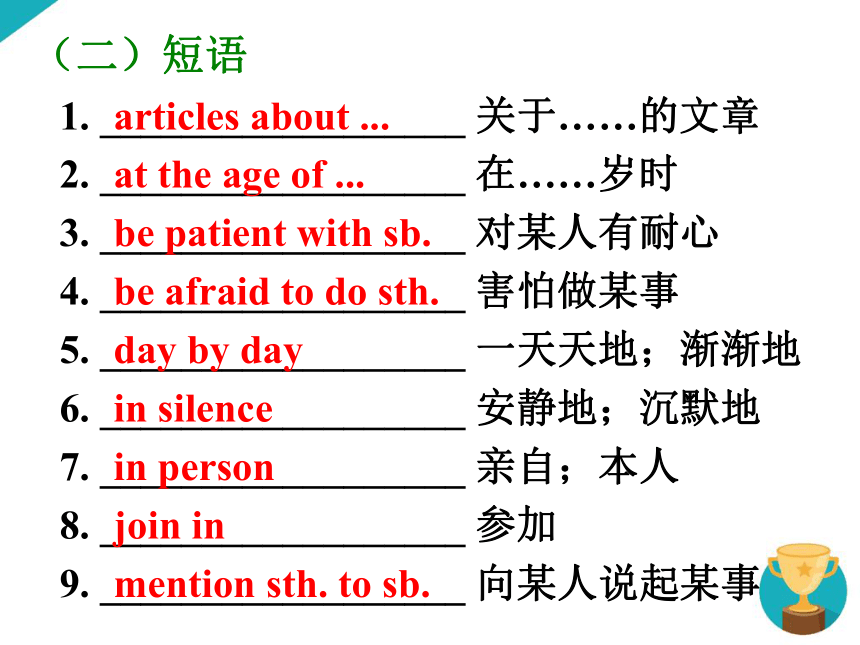
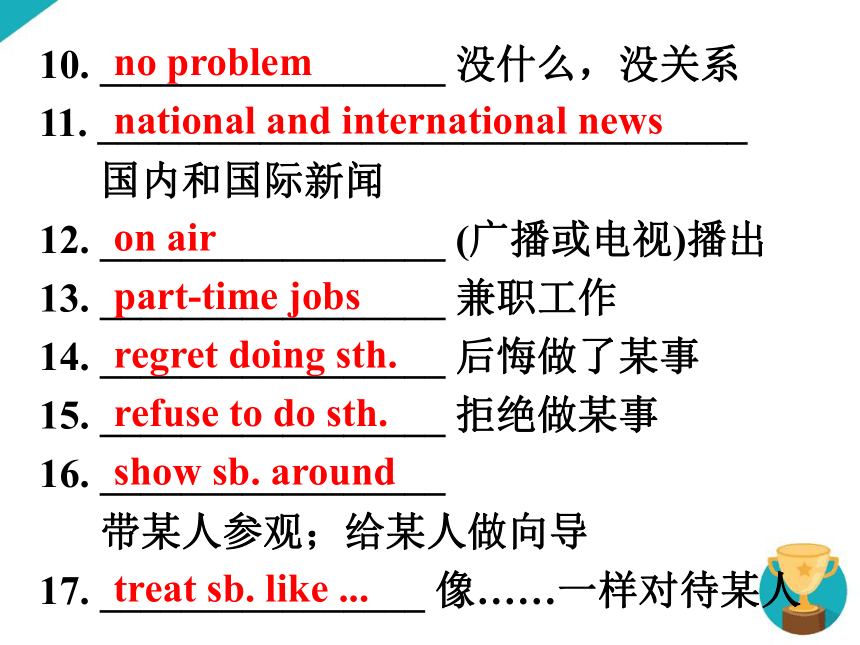
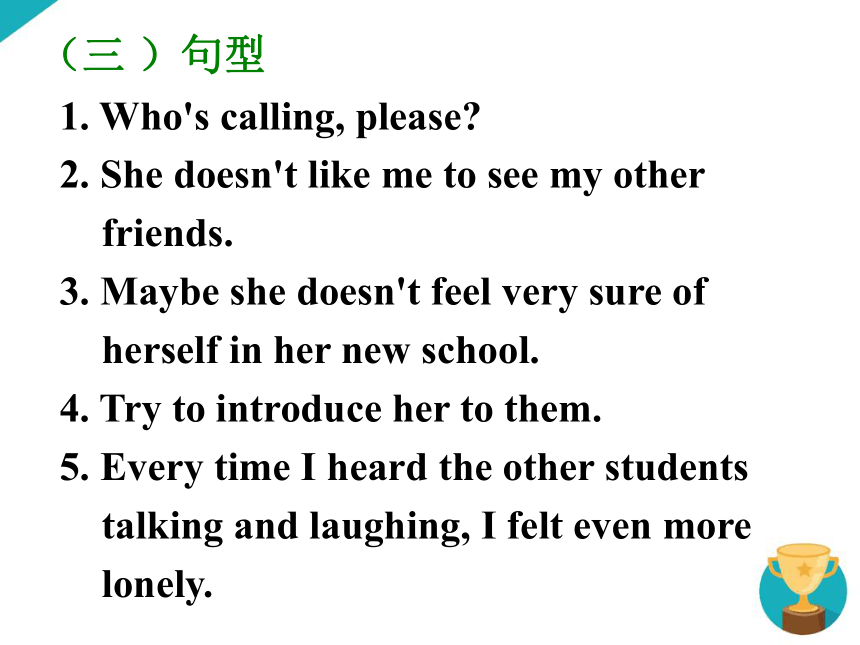
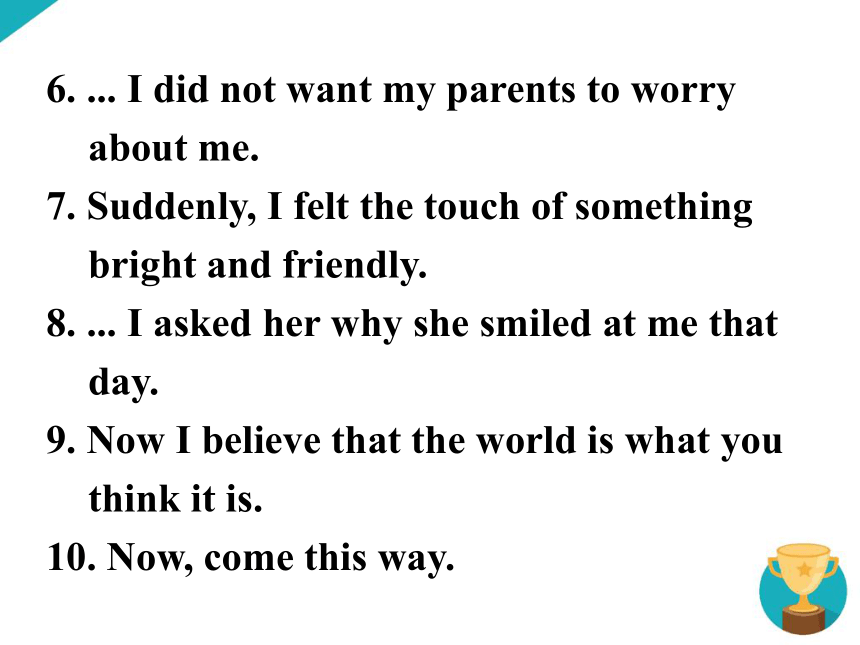
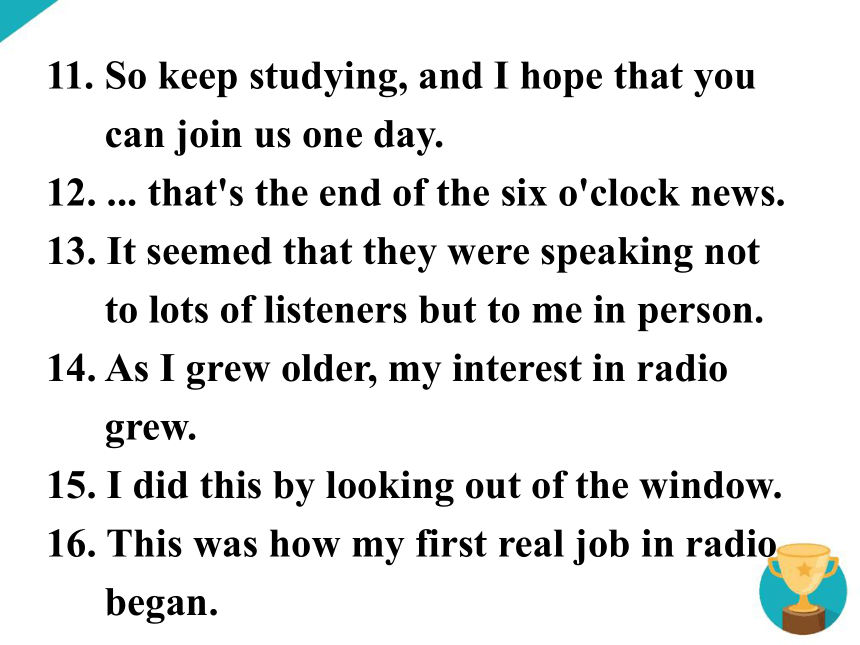
文档简介
课件84张PPT。Modules 9-101. ____________ v. 使分开;分隔
adj. 分开的;单独的
→ _________ adj. 分开的
2. ____________ n. 解释;说明
→ ___________ n. 解释;说明
3. ____________ v. 提及;谈到
→ ___________ adj. 提到的知识清单(一)单词separateseparatedexplainexplanationmentionmentioned4. ____________ v. 拒绝
5. ____________ v. 对待;看待
→ __________ n. 对待
6. ____________ pron. 她自己
7. _____________ conj. 孤独的;寂寞的
8. _____________ adj. 孤独的;寂寞的
→ ___________ adj. 孤单的;单独的
9. _____________ adj. 懊悔;遗憾
10. ___________ adj. 有耐心的;能忍耐的refusetreatherselftreatmentwhetherlonelylone / aloneregretpatient11. ____________ v. 介绍;引见
→ _____________ n. 介绍
12. ____________ v. 鼓励;激励
→ ______________ n. 鼓励;激励
13. ____________ n. 寂静;无声
→ _________ adj. 安静的;沉默的
14. ____________ v. 经过;通过
15. ____________ adj. 欢快的;明亮的
16. ____________ n. 珍宝;珍贵之物
17. ____________ v.& n. 信任;信赖 introduceencourageencouragementsilenceintroductionsilentpassbrighttreasuretrust18. __________ v. 包括;把……列为一部分
19. __________ n. (熟悉的、相关的人形
成的)圈子
20. _____________ v. 粘;粘贴
→ __________ 过去式/过去分词
21. _____________ n. 胶水
22. _____________ n. 提议;建议
→ ___________ v. 建议
23. _____________ n. 导演;主管;经理includecirclestickgluestucksuggestionsuggestdirector24. ______________ v. 引领;带领
25. ______________ adv. 到处;向各种
26. ______________ v. 避免;防止
27. ______________ n. 背景;后景
28. ______________ adj. 国家的;国内的
→ ___________ n. 国家
29. ______________ n. 国际的;世界的
30. ______________ n. 主持人showaroundavoidbackgroundnationalnationinternationalpresenter31. ______________ n. & v. 采访;访谈
→ ____________ n. 采访者
32. ______________ v. 看来;似乎
33. _____________ n. 听从;听者
→ ___________ v. 听
34. _____________ adj. 兼职的
35. _____________ n. 文章;报道
36. _____________ n. 录制室;录音室
37. _____________ n. 意图;目的interviewinterviewerseemlistenerlistenpart-timearticlestudiopurpose1. __________________?关于……的文章
2. __________________?在……岁时
3. __________________ 对某人有耐心
4. __________________?害怕做某事
5. __________________?一天天地;渐渐地
6. __________________?安静地;沉默地
7. __________________ 亲自;本人
8. __________________?参加
9. __________________?向某人说起某事(二)短语articles about ...?
at the age of ...?
be patient with sb.?
be afraid to do sth.??
day by day?
in silence?
in person
join in?
mention sth. to sb.?10. _________________?没什么,没关系
11. ________________________________?
国内和国际新闻
12. _________________ (广播或电视)播出
13. _________________?兼职工作
14. _________________?后悔做了某事
15. _________________ 拒绝做某事
16. _________________?
带某人参观;给某人做向导
17. ________________?像……一样对待某人no problem?
national and international news?
on air
part-time jobs?
regret doing sth.?
refuse to do sth.?
show sb. around?
treat sb. like ...???1. Who's calling, please?
2. She doesn't like me to see my other friends.
3. Maybe she doesn't feel very sure of herself in her new school.
4. Try to introduce her to them.
5. Every time I heard the other students talking and laughing, I felt even more lonely.(三 )句型 6. ... I did not want my parents to worry about me.
7. Suddenly, I felt the touch of something bright and friendly.
8. ... I asked her why she smiled at me that day.
9. Now I believe that the world is what you think it is.
10. Now, come this way.11. So keep studying, and I hope that you can join us one day.
12. ... that's the end of the six o'clock news.
13. It seemed that they were speaking not to lots of listeners but to me in person.
14. As I grew older, my interest in radio grew.
15. I did this by looking out of the window.
16. This was how my first real job in radio began.打电话(Making telephone calls)
A. Hello! May I speak to Tom?
Hello! I'd like to speak to Mr Green.
Is that Jenny speaking?
Can I leave a message?
I'll call back later / again.(四) 交际用语 B. Hello! This is Susan speaking.
Hello, who's this?
Hold the line, please.
Just a moment, please.
Hello, who's speaking?
Sorry. He / She isn't here right now.
Can I take a message?
Sorry. I can't hear you.
The line is bad / busy.
Sorry, I'm afraid you have the wrong number.?14. You can’t be serious!
15. Afternoon tea is not just a drink but a light meal at around 4 pm.
16. You need to stand in a line and wait your turn.
17. First of all, find out what’s wrong with him.
18. How can we do that?
19. Do not stand near street lights or under power lines.1. separate v. 使分开;分隔
n. 分开的;单独的核心要点(一)单词拓展
separate ... from ... 强调把不同的东西分开
divide ... into ... 强调把整体分为部分
get separated 分开2. explain v. 解释;说明归纳
explain sth. to sb. 向某人解释某事
explain + that / how / why
(向某人)解释/说明……
explain (to sb.) +疑问词+动词不定式3. refuse v. 拒绝归纳
refuse sb. / sth.? 拒绝某人或某事
refuse to do sth.? 拒绝做某事” 4. treat v. 对待;看待;招待;治疗
n. 招待归纳
treat sb. to sth. 请某人吃……
treat sb. for +疾病 给某人治疗某种疾病
give sb. a treat 招待某人
give sb. sth as a treat 用……招待某人 5. lonely adj. 孤独的;寂寞的根据汉语意思完成英语句子。
1.?露西一个人的时候,通常会看电视。
Lucy usually watches TV when she is _____.
2.?我独自住在这个房子里,但是从不觉得孤独。
I live in the house _____, but I never feel ________.
3.?这个故事是关于一位孤独的老人和他的狗。
The story is about a(n) ________ old man and his dog.alonealonelonely?lonely The old man often feels _______ because his children live far away. (2015聊城)
A. crazy B. lonely
C. hungry D. sleepyB 6. regret v. & n. 感到遗憾;懊悔归纳
regret to do sth.?遗憾要做某事
表示动作尚未发生
regret doing sth.?后悔做了某事
表示动作已经发生
to one’s regret 令某人遗憾的是
regret to say / tell 遗憾地说?/?告诉7. patient adj. 有耐心的;能忍耐的
n. 病人归纳
be patient with sb. 对某人有耐心
be patient to do sth. 有耐心做某事
拓展
impatient adj. 没有耐心的,急躁的
patience n. 耐心8. introduce v. 介绍;引见归纳
introduce sb. to sb. 把某人介绍给某人
introduce oneself? 做自我介绍
拓展
introduction n. 介绍;说明9. encourage v. 鼓励;激励归纳
encourage sb.? 鼓励某人
encourage sb. to do sth. 鼓励某人做某事10. silence n. 寂静;无声归纳
in silence 沉默地;安静地
keep in silence 保持沉默None of them talked. They finished their meal in ______. (2015苏州)
A. silence B. order C. place D. publicA 11. trust v. & n. 信任;信赖归纳
trust +名词或代词
trust (sb.) to do sth.
trust+(名词或代词)+that从句 12. include v. 包括;把……列为一部分
(不能用于进行时态) include contain用contain和include的适当形式填空。
1. His school bag __________ a lot of books, ___________ a cartoon book.
2. I believe that oranges _________ more vitamin C than apples.
3. There have been over 500 people who were saved, about 50 children _______.containsincludingcontain?included 13. suggestion n. 提议;建议 (可数名词 )归纳
make a suggestion 提出建议
take / follow one’s suggestion(s)
听从某人的建议
拓展
advice n. 建议 (不可数名词)
a piece of advice/ a suggestion 一条建议
give sb. some advice 给某人一些建议
take/follow one’s advice 听从某人的意见suggestion advice14. show v. 引领;带领;展示
n. 演出;节目 归纳
show sb. around 带某人参观
on show 展出
show sb. sth.?= show sth. to sb.
给……看 【温馨提示】
send, give, pass也可用于这两种结构。
send/give/pass sb. sth.?= send/give/pass sth.
to sb.
当sth.是代词时,只能用show / send /give/ pass sth. to sb.15. avoid v. 避免;防止归纳
avoid doing sth.
避免做某事
avoid sb. /sth.
躲避某人/某物
类似的接动名词的常见搭配:
enjoy dotig sth.
finish doing sth.suggest doing sth.
keep doing sth.
practise doing sth.
mind doing sth.
miss doing sth.
巧记
喜欢(enjoy)按照建议(suggest)一直(keep)练习(practise),直到完成(finish),避免(avoid)错过(miss)任何内容引起老师介意(mind)。16. interview v. & n. 采访;访谈归纳
interview sb. for sth.
(因某事)对某人进行面试
interview sb. about sth.
就某事采访某人
do an interview with sb. 采访某人
give an interview (某人)接受采访 17. seem v. 看来;似乎归纳
seem (+ to be) +形容词/名词(短语)等
seem to do sth.?
It seems that ...?
e.g. Tom seems (to be) happy.
She seems (to be) a smart girl.
Jack seems to want to visit the
museum.
It seems that someone is calling you. 18. purpose n. 意图;目的归纳
on purpose ?故意地
for / with the purpose of (doing) sth.
为了……的目的(二)短语join in ?参加
后面常接表示竞赛、娱乐、游戏等活动的名词。 拓展
join参加某个组织并成为其中的一员
take part in参加有组织、有计划的活动,强调参与性及作用
join sb. in (doing) sth.?与某人一起做某事根据句意填空。
1) We ___________ the English competition in?Shandong?in October, 2015.
2) Amy wants to ________ an English club to improve her spoken English.
3) You’d better ________ some activities after school. take part injoinjoin in(三)句式1. I was very lonely, and afraid to make friends with anyone.be afraid to do sth. 害怕做某事
be afraid of… 害怕……
be afraid + that从句 恐怕……
I’m afraid so. 恐怕如此。2. Every time I heard the other students talking and laughing, I felt even more lonely.
every time 每次
在本句中相当于一个连词词组,引导时间状语从句,相当于each time。
even 甚至
用于修饰比较级。比较级还可以用much, a lot, a little, a bit等词(组)修饰,表示不同程度。3. Now I believe that the world is what you think it is.
that the world is what you think it is是一个宾语从句,作动词believe的宾语。
在这个宾语从句中,“what you think it is”是一个表语从句,意为”你想象的那个样子。”4. It takes some time before they include new students in their circle of friends.
before在句中是连词,意为“在……之前”,引导时间状语从句。sometime some time
sometimes some times根据句意,?选用some times, some time,
sometimes或sometime填空。
1. Mona said she would visit her aunt ____________ next month.
2. The park is a great place. I have been there ____________.
3. Ann usually goes to work by bike, but ____________ by bus.
4. Leila has stayed in the mountains for ____________. She will stay there for another month.sometime?some timessometimessome time 5. When it’s on, it means we’re on air.
be on 上映;演出;在进行;(灯)亮着
通常作表语,与“be off”相对。
on air 正在广播6. So keep studying, and I hope that you can join us one day.
keep (on) doing sth. 一直做某事;坚持做某事
keep后不能接短暂性动词,必须接延续性动词。
拓展
keep sb. from doing sth. 阻止某人做某事
keep + adj. 保持……状态 (keep是系动词)7. As I grew older, my interest in radio grew.
主句和从句中的谓语动词均为grew,但用法不同:
从句中的grew为系动词,意为“变得”,后接形容词作表语;主句中的grew是不及物动词,意为“增长”。
as是连词,表示 “随着……”。
用来引导时间状语从句。as引导的时间状语从句时,主要有以下几种用法:1) 表示 “随着……”。
e.g. As he grows, he becomes stronger.
2) 表示“当……时间”,此时和when用法
相同。
As he was sleeping, a bird flew into his room.
3) 表示“一边……一边……”。
e.g. She sings as she walks home.8. It’s really nice of you to agree to talk to us…
It’s +形容词+ of sb. + to do sth.
形容词是描述人物的品格的词,如friendly, honest, kind等。
It’s +形容词+ for sb. + to do sth.
形容词是描述事物的词,如difficult, easy, hard, important, dangerous等。语法宾语从句 (Modules 9&10)
充当宾语的从句叫作宾语从句。学习宾语从句时,我们应该注意三个方面:引导词、语序和时态。引导词
1. that。肯定句作宾语从句,用that引导。that?在句中只起连接作用,不在从句中充当任何成分,that?在口语或非正式文体中常省略。如:
I think (that) they are right.
2. whether和if。一般疑问句作宾语从句,用whether或if引导。whether和if都有“是否”的意思,不能省略。如: He asks whether / if I can come to his birthday party.
3. who,what,which,how,when,where,why等。特殊疑问句作宾语从句,用以上引导词引导。这些词在宾语从句中有其本身的含义,并充当一定的成分,不能省略。如:
I want to know who broke the window.
Do you know when he bought that car?语序
无论主句是肯定句还是疑问句,也无论主从句间是什么引导词,宾语从句一律用陈述句语序。如:
I wonder if you've heard that man.
Do you believe that he'll finish that project on time?时态
1.?如果主句是现在的某种时态,宾语从句可根据实际情况来选择时态;如果主句是过去的某种时态,宾语从句常用相应的过去时态。如:
He hopes everything goes well.
I feel he has read that book.
The tall boy noticed someone had entered that room.2.?当宾语从句表示客观事实、自然现象或科学真理等时,其时态不受主句限制,要用一般现在时。如:
The teacher told me that light travels faster than sound.
只能用whether不能用if的情况:
1.?在介词的后面。如:
I'm thinking of whether we should go to see the film.2.?直接与or not连用时。如:
I can't say whether or not they can come on time.
注意:if后不能直接跟or not,但若or not
位于句尾时,则可用if。如:
Please tell me if you agree or not.1. -- Can?you?tell?me _________?
? -- He?lives?in?Shanghai.? (2016北京)
A. where?Mark?lives?
B. where?does?Mark?live?
C. where?Mark?lived?
D. where?did?Mark?live? 中考链接A 2. --- Do?you?know?________??
--- Let?me?see. I?remember?it?was?on?
March?18th. ? (2016重庆)
A. why?did?they?move?here?
B. why?they?moved?here?
C. when?did?they?move?here?
D. when?they?moved?here? D 3. -- I?wonder ________.?
--Yes, of?course.? (2016盐城)
A. why?we?will?visit?this?museum?
B. when?we?will?get?to?the?museum?
C. whether?the?museum?is?worth?visiting?
D. what?we?can?see?in?the?museum? C 4. ---When?will?you?fly?to?London??
---Pardon??
---I?asked _____ fly?to?London. (2016威海)
A. whether?you?would?
B. when?you?would?
C. how?you?will??? B 5. ---Does?anybody?want?to?share _____
on?Father’s?Day??
---I?bought?a?tie?for?my?father. He?loves?it. (2016厦门)
A. what?you?did?
B. where?you?went?
C. when?you?shopped A 6. -- I?just?came?back?from?Shanghai?
Disneyland. Can?you?guess?_______??
-- I’ve?no?idea. But?it?can’t?be?cheap.
I've?heard?everything?is?very?expensive.
(2016山西)
? A. how?I?came?back?home?
B. how?many?days?I?stayed?there?
C. how?much?I?paid?for?the?Mickey?
Mouse toy? C Ⅰ.?根据语境及所给汉语提示语写出所缺单词。
1. When Tom ________(经过) the house, he heard someone crying in it.
2. Jenny ________(对待) us like old friends although we've just been friends for two days.passed?巩固练习treats?3. What do you use the ________(胶水) to do?
4. They went to the island looking for ________(珍宝) last year.
5. Mr Wang is kind and he always ____________(鼓励) us to work hard at maths.
6. Can you help us ________(粘贴) these posters on the wall?glue?treasure? encourages?stick?7. What's your ________(目的) of doing this?
8. This is his __________(兼职的) job. He is still a student.
9. Let's do a(n) _________(采访) with Miss Smith this afternoon.
10. We should teach the children how to ________(避免) the traffic accidents.purpose?part-time?interviewavoid?Ⅱ.?根据语境及所给首字母提示补全所缺单词。
1. I don't understand what you said. Can you e________ it to me again?
2. We asked Lucy to watch the tennis game, but she r________.
3. The old man lives alone, but he never feels l________.
4. It s________ that Mike is good at running.explain?refused?lonelyseems?5. Don't turn on the lights. It's still b________ in the room at the moment.
6. Don't worry. The girl can do it well by h________.
7. Ann likes communicating with others and she has a wide c________ of friends.
8. Linda always keeps her promise. We should t________ her.bright?herself?circle?trust?9. Can you give us some s____________ on how to keep healthy?
10. I have a new friend here. Let me i____________ him to you.suggestions?introduceⅢ.?根据语境从方框中选择恰当的短语填空,有的需要变换形式,每个短语限用一次。
1. Eric went to the airport and met his parents _____________ yesterday.
2. —Thank you for telling me so much.????
—________________.join in, in person, smile at, no problem,
be patient with, in silence in person?No problem?3. John is a good teacher and he ________________ his students.
4. All the girls in the class want to ___________ this game.
5. The tall boy __________ me and waved just now.
6. Look! The little boy is sitting in the classroom ____________.join in, in person, smile at, no problem,
be patient with, in silence is patient with?join in?smiled at??in silenceIV. 根据汉语意思完成英语句子。
1.?他写了一些关于太空的文章。
He wrote some ________________ space.
2.?妈妈23岁时成了一名医生。
Mum became a doctor ______________ 23.
3.?我还是不敢在自己的卧室里睡觉。
I'm still afraid ____________ in my own bedroom.articles about?at the age of?to sleep?4.?她曾经跟我提过那件事。
She's ever __________ that thing ___ me.
5.?苏珊后悔放弃了那场比赛。
Susan regrets ___________ that competition.
6.?吉姆拒绝关小音乐。
Jim refused ______________ the music.???mentioned to?giving up?to turn downV. 根据括号内所给英文提示语将下列句子翻译成英语。
1.?每次我看到她,她都在打扫房间。?
(every time)
2.?天气一天天地变冷了。?(day by day)Every time I see her, she is cleaning the house.The weather gets colder day by day.??3.?请走这边,这是我们的办公室。?(come this way)
4.?谈话节目正在播出。?(on air)
5.?明天我将带领你们参观这个工厂。(show sb. around)Please come this way. This is our office.The talk show is on air.I will show you around this factory tomorrow.VI.?阅读短文,从方框中选择恰当的词并用其适当形式填空,使短文完整、通顺,每词限用一次。 In?The Giving Tree, a tree helps a boy in many ways throughout his life. Johanna Bozuwa read the book to fourth graders at a school in?Dallas,?Texas. Bozuwa works (1)_______ Earth Day Network (EDN). for?This group helps to improve the environment. While the class discussed the book, (2)___________ outside the classroom were planting 25 trees around the school's playground. “It was good for our school,” teacher Diana Birdsong said. She organised (组织) the activity.volunteers? This planting and many others are part of an EDN programme (3)_______ the Canopy Project. It started in 2012 and EDN (4)___________ to plant 10 million trees with partners over five years around the world.
In May 2014, EDN and partners planted 20 different (5)_______ of trees in?Denver,?
Colorado. called?promised?kinds ?A leader of the group said that this planting was also done (6)____________ air quality (质量). But the trees provide beauty and educational chances too.
So far, the Canopy Project has planted (7)_________ of trees in over 20 countries. to improve?millions?This (8)_________ trees planted in Haiti after terrible earthquakes, in Uganda to help improve farming, (9)_______ in France to restore (修复) forests.
Bozuwa says school tree plantings have an added (10)_______. includes?andvalue “Students now understand the importance of the trees outside their window and on their playground,” she says. “They will take care of the earth better for years to come.”
adj. 分开的;单独的
→ _________ adj. 分开的
2. ____________ n. 解释;说明
→ ___________ n. 解释;说明
3. ____________ v. 提及;谈到
→ ___________ adj. 提到的知识清单(一)单词separateseparatedexplainexplanationmentionmentioned4. ____________ v. 拒绝
5. ____________ v. 对待;看待
→ __________ n. 对待
6. ____________ pron. 她自己
7. _____________ conj. 孤独的;寂寞的
8. _____________ adj. 孤独的;寂寞的
→ ___________ adj. 孤单的;单独的
9. _____________ adj. 懊悔;遗憾
10. ___________ adj. 有耐心的;能忍耐的refusetreatherselftreatmentwhetherlonelylone / aloneregretpatient11. ____________ v. 介绍;引见
→ _____________ n. 介绍
12. ____________ v. 鼓励;激励
→ ______________ n. 鼓励;激励
13. ____________ n. 寂静;无声
→ _________ adj. 安静的;沉默的
14. ____________ v. 经过;通过
15. ____________ adj. 欢快的;明亮的
16. ____________ n. 珍宝;珍贵之物
17. ____________ v.& n. 信任;信赖 introduceencourageencouragementsilenceintroductionsilentpassbrighttreasuretrust18. __________ v. 包括;把……列为一部分
19. __________ n. (熟悉的、相关的人形
成的)圈子
20. _____________ v. 粘;粘贴
→ __________ 过去式/过去分词
21. _____________ n. 胶水
22. _____________ n. 提议;建议
→ ___________ v. 建议
23. _____________ n. 导演;主管;经理includecirclestickgluestucksuggestionsuggestdirector24. ______________ v. 引领;带领
25. ______________ adv. 到处;向各种
26. ______________ v. 避免;防止
27. ______________ n. 背景;后景
28. ______________ adj. 国家的;国内的
→ ___________ n. 国家
29. ______________ n. 国际的;世界的
30. ______________ n. 主持人showaroundavoidbackgroundnationalnationinternationalpresenter31. ______________ n. & v. 采访;访谈
→ ____________ n. 采访者
32. ______________ v. 看来;似乎
33. _____________ n. 听从;听者
→ ___________ v. 听
34. _____________ adj. 兼职的
35. _____________ n. 文章;报道
36. _____________ n. 录制室;录音室
37. _____________ n. 意图;目的interviewinterviewerseemlistenerlistenpart-timearticlestudiopurpose1. __________________?关于……的文章
2. __________________?在……岁时
3. __________________ 对某人有耐心
4. __________________?害怕做某事
5. __________________?一天天地;渐渐地
6. __________________?安静地;沉默地
7. __________________ 亲自;本人
8. __________________?参加
9. __________________?向某人说起某事(二)短语articles about ...?
at the age of ...?
be patient with sb.?
be afraid to do sth.??
day by day?
in silence?
in person
join in?
mention sth. to sb.?10. _________________?没什么,没关系
11. ________________________________?
国内和国际新闻
12. _________________ (广播或电视)播出
13. _________________?兼职工作
14. _________________?后悔做了某事
15. _________________ 拒绝做某事
16. _________________?
带某人参观;给某人做向导
17. ________________?像……一样对待某人no problem?
national and international news?
on air
part-time jobs?
regret doing sth.?
refuse to do sth.?
show sb. around?
treat sb. like ...???1. Who's calling, please?
2. She doesn't like me to see my other friends.
3. Maybe she doesn't feel very sure of herself in her new school.
4. Try to introduce her to them.
5. Every time I heard the other students talking and laughing, I felt even more lonely.(三 )句型 6. ... I did not want my parents to worry about me.
7. Suddenly, I felt the touch of something bright and friendly.
8. ... I asked her why she smiled at me that day.
9. Now I believe that the world is what you think it is.
10. Now, come this way.11. So keep studying, and I hope that you can join us one day.
12. ... that's the end of the six o'clock news.
13. It seemed that they were speaking not to lots of listeners but to me in person.
14. As I grew older, my interest in radio grew.
15. I did this by looking out of the window.
16. This was how my first real job in radio began.打电话(Making telephone calls)
A. Hello! May I speak to Tom?
Hello! I'd like to speak to Mr Green.
Is that Jenny speaking?
Can I leave a message?
I'll call back later / again.(四) 交际用语 B. Hello! This is Susan speaking.
Hello, who's this?
Hold the line, please.
Just a moment, please.
Hello, who's speaking?
Sorry. He / She isn't here right now.
Can I take a message?
Sorry. I can't hear you.
The line is bad / busy.
Sorry, I'm afraid you have the wrong number.?14. You can’t be serious!
15. Afternoon tea is not just a drink but a light meal at around 4 pm.
16. You need to stand in a line and wait your turn.
17. First of all, find out what’s wrong with him.
18. How can we do that?
19. Do not stand near street lights or under power lines.1. separate v. 使分开;分隔
n. 分开的;单独的核心要点(一)单词拓展
separate ... from ... 强调把不同的东西分开
divide ... into ... 强调把整体分为部分
get separated 分开2. explain v. 解释;说明归纳
explain sth. to sb. 向某人解释某事
explain + that / how / why
(向某人)解释/说明……
explain (to sb.) +疑问词+动词不定式3. refuse v. 拒绝归纳
refuse sb. / sth.? 拒绝某人或某事
refuse to do sth.? 拒绝做某事” 4. treat v. 对待;看待;招待;治疗
n. 招待归纳
treat sb. to sth. 请某人吃……
treat sb. for +疾病 给某人治疗某种疾病
give sb. a treat 招待某人
give sb. sth as a treat 用……招待某人 5. lonely adj. 孤独的;寂寞的根据汉语意思完成英语句子。
1.?露西一个人的时候,通常会看电视。
Lucy usually watches TV when she is _____.
2.?我独自住在这个房子里,但是从不觉得孤独。
I live in the house _____, but I never feel ________.
3.?这个故事是关于一位孤独的老人和他的狗。
The story is about a(n) ________ old man and his dog.alonealonelonely?lonely The old man often feels _______ because his children live far away. (2015聊城)
A. crazy B. lonely
C. hungry D. sleepyB 6. regret v. & n. 感到遗憾;懊悔归纳
regret to do sth.?遗憾要做某事
表示动作尚未发生
regret doing sth.?后悔做了某事
表示动作已经发生
to one’s regret 令某人遗憾的是
regret to say / tell 遗憾地说?/?告诉7. patient adj. 有耐心的;能忍耐的
n. 病人归纳
be patient with sb. 对某人有耐心
be patient to do sth. 有耐心做某事
拓展
impatient adj. 没有耐心的,急躁的
patience n. 耐心8. introduce v. 介绍;引见归纳
introduce sb. to sb. 把某人介绍给某人
introduce oneself? 做自我介绍
拓展
introduction n. 介绍;说明9. encourage v. 鼓励;激励归纳
encourage sb.? 鼓励某人
encourage sb. to do sth. 鼓励某人做某事10. silence n. 寂静;无声归纳
in silence 沉默地;安静地
keep in silence 保持沉默None of them talked. They finished their meal in ______. (2015苏州)
A. silence B. order C. place D. publicA 11. trust v. & n. 信任;信赖归纳
trust +名词或代词
trust (sb.) to do sth.
trust+(名词或代词)+that从句 12. include v. 包括;把……列为一部分
(不能用于进行时态) include contain用contain和include的适当形式填空。
1. His school bag __________ a lot of books, ___________ a cartoon book.
2. I believe that oranges _________ more vitamin C than apples.
3. There have been over 500 people who were saved, about 50 children _______.containsincludingcontain?included 13. suggestion n. 提议;建议 (可数名词 )归纳
make a suggestion 提出建议
take / follow one’s suggestion(s)
听从某人的建议
拓展
advice n. 建议 (不可数名词)
a piece of advice/ a suggestion 一条建议
give sb. some advice 给某人一些建议
take/follow one’s advice 听从某人的意见suggestion advice14. show v. 引领;带领;展示
n. 演出;节目 归纳
show sb. around 带某人参观
on show 展出
show sb. sth.?= show sth. to sb.
给……看 【温馨提示】
send, give, pass也可用于这两种结构。
send/give/pass sb. sth.?= send/give/pass sth.
to sb.
当sth.是代词时,只能用show / send /give/ pass sth. to sb.15. avoid v. 避免;防止归纳
avoid doing sth.
避免做某事
avoid sb. /sth.
躲避某人/某物
类似的接动名词的常见搭配:
enjoy dotig sth.
finish doing sth.suggest doing sth.
keep doing sth.
practise doing sth.
mind doing sth.
miss doing sth.
巧记
喜欢(enjoy)按照建议(suggest)一直(keep)练习(practise),直到完成(finish),避免(avoid)错过(miss)任何内容引起老师介意(mind)。16. interview v. & n. 采访;访谈归纳
interview sb. for sth.
(因某事)对某人进行面试
interview sb. about sth.
就某事采访某人
do an interview with sb. 采访某人
give an interview (某人)接受采访 17. seem v. 看来;似乎归纳
seem (+ to be) +形容词/名词(短语)等
seem to do sth.?
It seems that ...?
e.g. Tom seems (to be) happy.
She seems (to be) a smart girl.
Jack seems to want to visit the
museum.
It seems that someone is calling you. 18. purpose n. 意图;目的归纳
on purpose ?故意地
for / with the purpose of (doing) sth.
为了……的目的(二)短语join in ?参加
后面常接表示竞赛、娱乐、游戏等活动的名词。 拓展
join参加某个组织并成为其中的一员
take part in参加有组织、有计划的活动,强调参与性及作用
join sb. in (doing) sth.?与某人一起做某事根据句意填空。
1) We ___________ the English competition in?Shandong?in October, 2015.
2) Amy wants to ________ an English club to improve her spoken English.
3) You’d better ________ some activities after school. take part injoinjoin in(三)句式1. I was very lonely, and afraid to make friends with anyone.be afraid to do sth. 害怕做某事
be afraid of… 害怕……
be afraid + that从句 恐怕……
I’m afraid so. 恐怕如此。2. Every time I heard the other students talking and laughing, I felt even more lonely.
every time 每次
在本句中相当于一个连词词组,引导时间状语从句,相当于each time。
even 甚至
用于修饰比较级。比较级还可以用much, a lot, a little, a bit等词(组)修饰,表示不同程度。3. Now I believe that the world is what you think it is.
that the world is what you think it is是一个宾语从句,作动词believe的宾语。
在这个宾语从句中,“what you think it is”是一个表语从句,意为”你想象的那个样子。”4. It takes some time before they include new students in their circle of friends.
before在句中是连词,意为“在……之前”,引导时间状语从句。sometime some time
sometimes some times根据句意,?选用some times, some time,
sometimes或sometime填空。
1. Mona said she would visit her aunt ____________ next month.
2. The park is a great place. I have been there ____________.
3. Ann usually goes to work by bike, but ____________ by bus.
4. Leila has stayed in the mountains for ____________. She will stay there for another month.sometime?some timessometimessome time 5. When it’s on, it means we’re on air.
be on 上映;演出;在进行;(灯)亮着
通常作表语,与“be off”相对。
on air 正在广播6. So keep studying, and I hope that you can join us one day.
keep (on) doing sth. 一直做某事;坚持做某事
keep后不能接短暂性动词,必须接延续性动词。
拓展
keep sb. from doing sth. 阻止某人做某事
keep + adj. 保持……状态 (keep是系动词)7. As I grew older, my interest in radio grew.
主句和从句中的谓语动词均为grew,但用法不同:
从句中的grew为系动词,意为“变得”,后接形容词作表语;主句中的grew是不及物动词,意为“增长”。
as是连词,表示 “随着……”。
用来引导时间状语从句。as引导的时间状语从句时,主要有以下几种用法:1) 表示 “随着……”。
e.g. As he grows, he becomes stronger.
2) 表示“当……时间”,此时和when用法
相同。
As he was sleeping, a bird flew into his room.
3) 表示“一边……一边……”。
e.g. She sings as she walks home.8. It’s really nice of you to agree to talk to us…
It’s +形容词+ of sb. + to do sth.
形容词是描述人物的品格的词,如friendly, honest, kind等。
It’s +形容词+ for sb. + to do sth.
形容词是描述事物的词,如difficult, easy, hard, important, dangerous等。语法宾语从句 (Modules 9&10)
充当宾语的从句叫作宾语从句。学习宾语从句时,我们应该注意三个方面:引导词、语序和时态。引导词
1. that。肯定句作宾语从句,用that引导。that?在句中只起连接作用,不在从句中充当任何成分,that?在口语或非正式文体中常省略。如:
I think (that) they are right.
2. whether和if。一般疑问句作宾语从句,用whether或if引导。whether和if都有“是否”的意思,不能省略。如: He asks whether / if I can come to his birthday party.
3. who,what,which,how,when,where,why等。特殊疑问句作宾语从句,用以上引导词引导。这些词在宾语从句中有其本身的含义,并充当一定的成分,不能省略。如:
I want to know who broke the window.
Do you know when he bought that car?语序
无论主句是肯定句还是疑问句,也无论主从句间是什么引导词,宾语从句一律用陈述句语序。如:
I wonder if you've heard that man.
Do you believe that he'll finish that project on time?时态
1.?如果主句是现在的某种时态,宾语从句可根据实际情况来选择时态;如果主句是过去的某种时态,宾语从句常用相应的过去时态。如:
He hopes everything goes well.
I feel he has read that book.
The tall boy noticed someone had entered that room.2.?当宾语从句表示客观事实、自然现象或科学真理等时,其时态不受主句限制,要用一般现在时。如:
The teacher told me that light travels faster than sound.
只能用whether不能用if的情况:
1.?在介词的后面。如:
I'm thinking of whether we should go to see the film.2.?直接与or not连用时。如:
I can't say whether or not they can come on time.
注意:if后不能直接跟or not,但若or not
位于句尾时,则可用if。如:
Please tell me if you agree or not.1. -- Can?you?tell?me _________?
? -- He?lives?in?Shanghai.? (2016北京)
A. where?Mark?lives?
B. where?does?Mark?live?
C. where?Mark?lived?
D. where?did?Mark?live? 中考链接A 2. --- Do?you?know?________??
--- Let?me?see. I?remember?it?was?on?
March?18th. ? (2016重庆)
A. why?did?they?move?here?
B. why?they?moved?here?
C. when?did?they?move?here?
D. when?they?moved?here? D 3. -- I?wonder ________.?
--Yes, of?course.? (2016盐城)
A. why?we?will?visit?this?museum?
B. when?we?will?get?to?the?museum?
C. whether?the?museum?is?worth?visiting?
D. what?we?can?see?in?the?museum? C 4. ---When?will?you?fly?to?London??
---Pardon??
---I?asked _____ fly?to?London. (2016威海)
A. whether?you?would?
B. when?you?would?
C. how?you?will??? B 5. ---Does?anybody?want?to?share _____
on?Father’s?Day??
---I?bought?a?tie?for?my?father. He?loves?it. (2016厦门)
A. what?you?did?
B. where?you?went?
C. when?you?shopped A 6. -- I?just?came?back?from?Shanghai?
Disneyland. Can?you?guess?_______??
-- I’ve?no?idea. But?it?can’t?be?cheap.
I've?heard?everything?is?very?expensive.
(2016山西)
? A. how?I?came?back?home?
B. how?many?days?I?stayed?there?
C. how?much?I?paid?for?the?Mickey?
Mouse toy? C Ⅰ.?根据语境及所给汉语提示语写出所缺单词。
1. When Tom ________(经过) the house, he heard someone crying in it.
2. Jenny ________(对待) us like old friends although we've just been friends for two days.passed?巩固练习treats?3. What do you use the ________(胶水) to do?
4. They went to the island looking for ________(珍宝) last year.
5. Mr Wang is kind and he always ____________(鼓励) us to work hard at maths.
6. Can you help us ________(粘贴) these posters on the wall?glue?treasure? encourages?stick?7. What's your ________(目的) of doing this?
8. This is his __________(兼职的) job. He is still a student.
9. Let's do a(n) _________(采访) with Miss Smith this afternoon.
10. We should teach the children how to ________(避免) the traffic accidents.purpose?part-time?interviewavoid?Ⅱ.?根据语境及所给首字母提示补全所缺单词。
1. I don't understand what you said. Can you e________ it to me again?
2. We asked Lucy to watch the tennis game, but she r________.
3. The old man lives alone, but he never feels l________.
4. It s________ that Mike is good at running.explain?refused?lonelyseems?5. Don't turn on the lights. It's still b________ in the room at the moment.
6. Don't worry. The girl can do it well by h________.
7. Ann likes communicating with others and she has a wide c________ of friends.
8. Linda always keeps her promise. We should t________ her.bright?herself?circle?trust?9. Can you give us some s____________ on how to keep healthy?
10. I have a new friend here. Let me i____________ him to you.suggestions?introduceⅢ.?根据语境从方框中选择恰当的短语填空,有的需要变换形式,每个短语限用一次。
1. Eric went to the airport and met his parents _____________ yesterday.
2. —Thank you for telling me so much.????
—________________.join in, in person, smile at, no problem,
be patient with, in silence in person?No problem?3. John is a good teacher and he ________________ his students.
4. All the girls in the class want to ___________ this game.
5. The tall boy __________ me and waved just now.
6. Look! The little boy is sitting in the classroom ____________.join in, in person, smile at, no problem,
be patient with, in silence is patient with?join in?smiled at??in silenceIV. 根据汉语意思完成英语句子。
1.?他写了一些关于太空的文章。
He wrote some ________________ space.
2.?妈妈23岁时成了一名医生。
Mum became a doctor ______________ 23.
3.?我还是不敢在自己的卧室里睡觉。
I'm still afraid ____________ in my own bedroom.articles about?at the age of?to sleep?4.?她曾经跟我提过那件事。
She's ever __________ that thing ___ me.
5.?苏珊后悔放弃了那场比赛。
Susan regrets ___________ that competition.
6.?吉姆拒绝关小音乐。
Jim refused ______________ the music.???mentioned to?giving up?to turn downV. 根据括号内所给英文提示语将下列句子翻译成英语。
1.?每次我看到她,她都在打扫房间。?
(every time)
2.?天气一天天地变冷了。?(day by day)Every time I see her, she is cleaning the house.The weather gets colder day by day.??3.?请走这边,这是我们的办公室。?(come this way)
4.?谈话节目正在播出。?(on air)
5.?明天我将带领你们参观这个工厂。(show sb. around)Please come this way. This is our office.The talk show is on air.I will show you around this factory tomorrow.VI.?阅读短文,从方框中选择恰当的词并用其适当形式填空,使短文完整、通顺,每词限用一次。 In?The Giving Tree, a tree helps a boy in many ways throughout his life. Johanna Bozuwa read the book to fourth graders at a school in?Dallas,?Texas. Bozuwa works (1)_______ Earth Day Network (EDN). for?This group helps to improve the environment. While the class discussed the book, (2)___________ outside the classroom were planting 25 trees around the school's playground. “It was good for our school,” teacher Diana Birdsong said. She organised (组织) the activity.volunteers? This planting and many others are part of an EDN programme (3)_______ the Canopy Project. It started in 2012 and EDN (4)___________ to plant 10 million trees with partners over five years around the world.
In May 2014, EDN and partners planted 20 different (5)_______ of trees in?Denver,?
Colorado. called?promised?kinds ?A leader of the group said that this planting was also done (6)____________ air quality (质量). But the trees provide beauty and educational chances too.
So far, the Canopy Project has planted (7)_________ of trees in over 20 countries. to improve?millions?This (8)_________ trees planted in Haiti after terrible earthquakes, in Uganda to help improve farming, (9)_______ in France to restore (修复) forests.
Bozuwa says school tree plantings have an added (10)_______. includes?andvalue “Students now understand the importance of the trees outside their window and on their playground,” she says. “They will take care of the earth better for years to come.”
